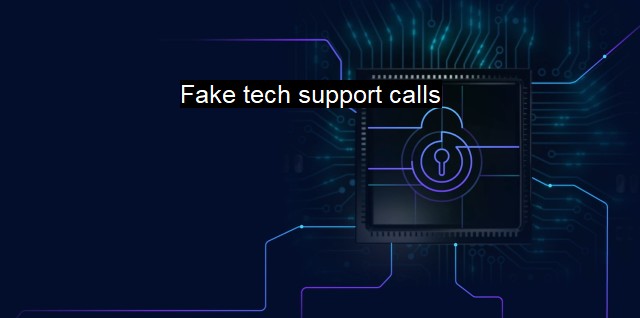What are Fake tech support calls?
The Dangers of Fake Tech Support Calls in the Digital Age: How Cybercriminals Exploit Vulnerabilities to Steal Information and Extort Money From Unsuspecting Users
Fake tech support is a scam frequently employed by fraudsters to exploit occasional bugs and crashes experienced by users of technology products. In this typical scenario, a fraudster impersonates a staff member from a tech firm such as Microsoft, Apple, or a well-known antivirus software company. This deceitful ploy to extract sensitive information from unsuspecting users falls within the realm of cybersecurity due to its implications on data privacy and digital system integrity.Contrary to genuine tech support calls that are initiated by the user, these suppressive infiltration attempts are typically launched unexpectedly. Users receive unsolicited calls from perpetrators alleging system infiltrations or critical software failures which need instant amelioration. The caller often insists that undetected viruses, malware, or suspicious activities have been detected on the victim's computer. Winning the victim's trust by inciting alarm and urgency is a keystone in the scammer's ploy.
To seemingly resolve the proclaimed 'issues,' the imposter asks for remote access to the supposed 'compromised' system. This fraudulent activity involves gaining unauthorized accessibility to personal data, financial information, and any other valuable data. If given access, the imposter has free rein to install viruses, malware, or spyware, essentially leaving the system vulnerable to future attacks and further compromising the system's integrity.
In certain scenarios, scammers may request individuals purchase antivirus software from them or ask for personal credit card information to resolve the technical issue. Duped into consenting to pay unnecessary fees, users helplessly watch as monies are stealthily siphoned from their accounts. Astonishingly, not all attempts are fiscally motivated, with some scammers desiring to wreak as much havoc as possible by corrupting or wiping data.
Fake tech support calls render users vulnerable to identity theft. Once scammers gain unauthorized access to personal data, they can further exploit this sensitive information for potential illegal activities, including unauthorized purchases, bank frauds, selling information to other hackers, or even transforming the victim's computer or network into a zombie part of a botnet.
The advancement in VoIP technology has made it convenient for fraudsters to propagate such scams from any part of the world while concealing their original identity and location, thereby making it harder for authorities to apprehend them. This leads towards a relatively 'low risk – high reward' scenario for such scams from the criminals' perspective.
Based on their baneful implication, fake tech support calls pose a significant cybersecurity threat necessitating prompt and cautious solutions to thwart such infringements. Awareness campaigns sponsored by authentic tech companies discredit such deceitful techniques using established connections with customers.
Tech companies, in collaboration with cybersecurity experts, continuously endeavor to establish technologies to detect and block such scammers. Yet, the most effective way to ensure safety is to be fully aware, remain skeptical of unsolicited fire-branded tech messages, and refrain from disclosing personal or financial information on calls or any insecure platforms.
By understanding the modus operandi of such devious scams and prudently approaching suspicious calls, users can significantly reduce the threat from such cybersecurity infringements. Regrettably, as digital technology continues to expand, accompanying cybersecurity threats like fake tech support calls manifest, requiring constant vigilance, awareness, and advanced protective measures to counteract these malicious ploys.

Fake tech support calls FAQs
What are fake tech support calls?
Fake tech support calls are scams in which cybercriminals pose as legitimate tech support representatives and contact individuals claiming to provide technical support for issues with their devices.How can I recognize a fake tech support call?
Fake tech support calls are usually unsolicited, meaning that they come out of the blue without being requested. The caller may claim to be from a reputable company, such as Microsoft or Apple, and use scare tactics to convince you that your device has been infected with a virus or malware. They may ask you to download software or grant remote access to your device.What should I do if I receive a fake tech support call?
If you receive a fake tech support call, do not engage with the caller or provide any personal information. Hang up immediately and report the scam to the appropriate authorities.How can I protect myself from fake tech support calls?
To protect yourself from fake tech support calls, be cautious when receiving unsolicited calls claiming to provide technical support. Do not provide personal information, download software, or grant remote access to your device unless you are certain that the caller is legitimate. Keep your antivirus software and operating system up to date, and educate yourself on common cybersecurity threats and scams.| | A | | | B | | | C | | | D | | | E | | | F | | | G | | | H | | | I | | | J | | | K | | | L | | | M | |
| | N | | | O | | | P | | | Q | | | R | | | S | | | T | | | U | | | V | | | W | | | X | | | Y | | | Z | |
| | 1 | | | 2 | | | 3 | | | 4 | | | 7 | | | 8 | | |||||||